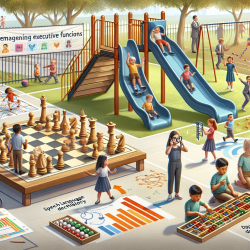Introduction
In the realm of child development, enhancing executive functions (EFs) is crucial for fostering academic success and overall cognitive growth. Recent research has highlighted the potential benefits of cognitively engaging physical activities in improving these functions in children. This blog explores the findings of a study titled "Effect of Cognitively Engaging Physical Activity on Executive Functions in Children" and provides insights for practitioners to enhance their skills and encourage further research.
Understanding Executive Functions
Executive functions are higher-order cognitive processes that include inhibition, working memory, and cognitive flexibility. These functions are essential for controlling behavior, maintaining attention, and solving problems. Enhancing EFs in children can lead to improved academic performance and better psychosocial outcomes.
The Role of Cognitively Engaging Physical Activity
The study conducted by Bulten et al. (2022) investigated the impact of cognitively engaging physical activity on EFs in children. The researchers hypothesized that activities combining physical exertion with cognitive engagement would lead to greater improvements in EFs compared to physical or cognitive tasks alone.
Key Findings
The study involved 38 children aged around 12 years, who were randomly assigned to one of three experimental conditions: a Dual Task (cognitively engaging physical activity), a Physical Activity Task, and a Cognitive Task. The results indicated significant improvements in inhibition scores and positive affect across all conditions, suggesting that any form of activity might be beneficial for enhancing EFs and mood in children.
Implications for Practitioners
While the study did not find a superior effect of cognitively engaging physical activity on EFs, the results highlight the potential of integrating such activities into educational settings. Practitioners can consider the following strategies:
- Incorporate short, engaging physical activities that require cognitive engagement, such as interactive games or problem-solving tasks.
- Ensure activities are enjoyable and varied to maintain children's interest and motivation.
- Monitor the intensity of physical activities to prevent over-exertion, which may negatively impact cognitive performance.
Encouraging Further Research
The mixed results in the literature regarding the impact of cognitively engaging physical activity on EFs suggest the need for further research. Future studies should explore different types of activities, varying intensities, and the role of affect and fitness as mediators or moderators in this relationship.
Conclusion
While the study by Bulten et al. (2022) did not conclusively demonstrate the superiority of cognitively engaging physical activities for improving EFs, it provides valuable insights for practitioners. By incorporating engaging activities into educational settings, we can potentially enhance children's cognitive and emotional well-being. For those interested in delving deeper into the research, I encourage you to read the original research paper: Effect of cognitively engaging physical activity on executive functions in children.










